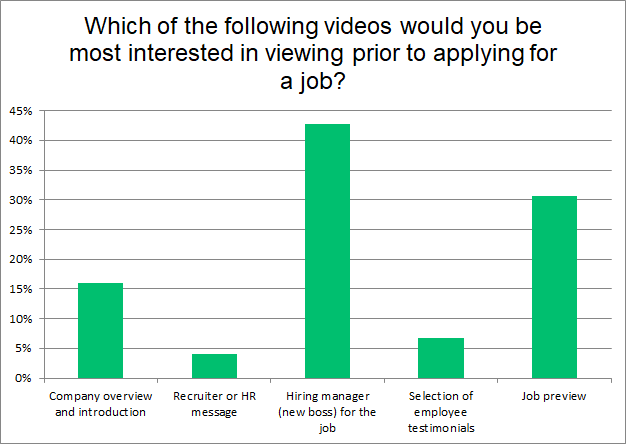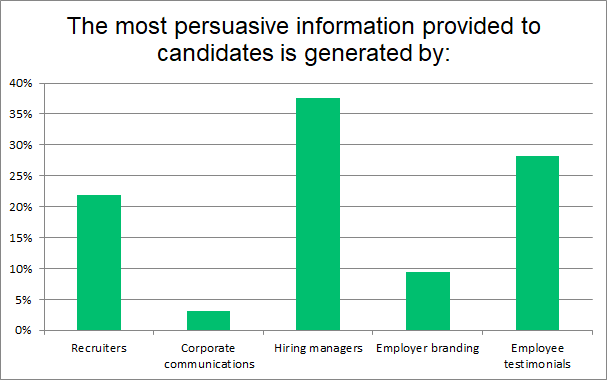
Candidate experience is on everyone’s lips these days, but the discussion is rare when companies actually ask candidates what they want and attempt to provide it. In our latest research study on Video and the Candidate Experience, we looked not just at how companies are using video but also at how candidates want to consume and interact with video in the hiring process.
[Editor’s note: Be sure to check out our follow up piece: The ROI of Video in the Candidate Experience]
This study sheds light on ways companies are wasting money on video production while failing to meet the preferences for candidates. I walked away from this study with an overwhelming sense of “people want to work for people, not companies,” so let’s jump into the data and see what we found.
Key Research Findings
- Candidates want to see videos of hiring managers 2.5x more often than company overviews and 10x more often than an HR/recruiter message.
- A hiring manager welcome video would make a candidate 46% more likely to consider the job and 30% more likely to respond to a recruiter or apply.
- 55% of active job seekers said employee-generated video would be more credible/trustworthy than company-produced video.
- Employers believe that hiring managers are the most persuasive source of information for candidates, but only 3% of employers are using this kind of content to reach job seekers.
Candidates want Information Directly from Employees
How much did your company spend on that “company overview” branding video that you have on your careers page? $5,000? $25,000? Whatever the investment, it might come as a bit of a shock to find out that candidates, especially active ones, don’t really see that as a source of valuable information during the job search process.
Figure 1: Candidate Video Preferences

As you can see in the data, candidates overwhelmingly want to see and hear from the hiring manager in the application process. The theme that “people want to work for people, not companies” is especially apparent in this response.
Candidates want to see videos of hiring managers 2.5x more often than company overviews and 10x more often than an HR/recruiter message.
Additionally, the second most common preference for candidates was to see and learn more about the job itself through a preview of sorts.Candidates naturally want to perform well in the interview and on the job and they believe that these two sources of information can help them to do so, which echoes our research earlier this year around candidate experience, assessments, and video interviews. The exciting part is that candidates went a step further, saying that this was not only what they wanted to see to gather information, but also that it could potentially lead them to consider and apply for jobs that might have otherwise not been on their radar.
Candidates said a hiring manager welcome video would make the person 46% more likely to consider the job and 30% more likely to respond to a recruiter or apply.
The theme that connects these top two answers and that should serve as a powerful takeaway for employers is this: candidate experience is especially powerful when it feels somewhat tailored. If I’m applying for a job and get to see information about that job beyond a static job description that I believe might help me to make a better decision or better understand the role, that’s incredibly valuable. In the same way, employers can provide short videos or comments directly from hiring managers or job preview information as a way to help guide candidates toward better decisions and improve the overall candidate experience at the same time.
Credibility is Key When Using Video
While our survey didn’t dive into specifics around why employee-generated video is more valuable for candidates than company-produced video, one of our hypotheses is that people naturally want to see a more raw, personal video than a scripted, highly produced video that doesn’t necessarily reflect reality. That’s why tools like live video streaming or even social photo/video sharing have become more pervasive in the last few years. As consumers we look for this kind of information, so why wouldn’t job candidates?
55% of active job seekers said employee-generated video would be more credible/trustworthy than company-produced video.
One of the things I was careful of doing in this study was trying to specifically quantify the value and credibility of information coming from hiring managers versus the company. As we can see in this example, when we asked candidates about what source provides the most credible, trustworthy information, it’s clear that employee video is preferred.
What’s surprising is that employers agreed.
Figure 2: Employers Say Hiring Managers Offer Most Persuasive Information

In this question we asked employers to rank the most persuasive sources of information for candidates. Hiring managers came in first followed by employee testimonials, yet when we asked how many employers were using these types of information in their candidate journey, only 3 percent were using hiring manager videos and just 13 percent were using employee testimonials.
This begs the question, if candidates crave this information and employers consider it to be the most valuable, why aren’t companies offering these kinds of elements on their career page, social channels, and other platforms?
Key Takeaways
One of the fun parts of doing this dual research is that it helps to shed light on where employers can improve their practices to meet the needs of candidates. In this case, there are a few clear takeaways.
- Employers need to start exploring how to embed more hiring manager content into their candidate experience. They know it works. Candidates know it works. There’s no excuse and it could lead to a radical improvement in candidate perception and trust.
- Go for something less “pretty” and more “raw” in terms of video. Trying to produce and script a video diminishes the value in the eyes of candidates and it takes longer, costs more, and is generally more of a hassle for the hiring managers and other employees taking part.
If you get nothing else from this research, take it as a helpful push to look for ways to interact with and ask questions of your own candidate audience. Hopefully this sheds some light on how employers are completely missing the mark on what candidates really want in the hiring process and gives you an idea for how you can improve your own approach.
Disclaimer: All research insights and opinions provided by Lighthouse Research & Advisory are unbiased and are not influenced by sponsorship. As an independent analyst firm we perform research in a variety of HCM areas in order to better understand the market and this study is one of multiple research efforts we have produced this year in an effort to help employers hire, engage, and retain their best workers. Questions about our policy and approach can be directed to ben.eubanks@lhra.io.

Ben Eubanks is the Chief Research Officer at Lighthouse Research & Advisory. He is an author, speaker, and researcher with a passion for telling stories and making complex topics easy to understand.
His latest book Talent Scarcity answers the question every business leader has asked in recent years: “Where are all the people, and how do we get them back to work?” It shares practical and strategic recruiting and retention ideas and case studies for every employer.
His first book, Artificial Intelligence for HR, is the world’s most-cited resource on AI applications for hiring, development, and employee experience.
Ben has more than 10 years of experience both as an HR/recruiting executive as well as a researcher on workplace topics. His work is practical, relevant, and valued by practitioners from F100 firms to SMB organizations across the globe.
He has spoken to tens of thousands of HR professionals across the globe and enjoys sharing about technology, talent practices, and more. His speaking credits include the SHRM Annual Conference, Seminarium International, PeopleMatters Dubai and India, and over 100 other notable events.

